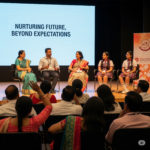
Elections as a Means of Enlightenment: Is This What We Desire?
- admin
- July 27, 2025
- Development, Knowledge, Leaders, Politics
- 0 Comments
New Delhi, 2025 — Elections, at their core, are designed to be a reflection of the people’s voice, a tool for democratic participation where citizens choose their leaders based on values, vision, and trust. Yet, in the current political climate, one must ask: Are elections truly serving as a means of enlightenment? Or are they just another spectacle, designed more for power struggles than for the cultivation of wisdom and thoughtful governance?
This question becomes more pressing in India, where the democratic process often feels fragmented and influenced by populism, misinformation, and fleeting promises, leaving many to wonder if elections can still be a true tool of enlightenment or if they have lost their deeper purpose.
Elections as a Democratic Ideal
- Foundations of Enlightenment in Democracy
- The idea of enlightenment in politics is not new. In ancient Greece, thinkers like Plato argued that the rulers should be philosophers, guiding the state with knowledge and wisdom. In India, Mahatma Gandhiemphasized truth, service, and non-violence as pillars of leadership, offering a vision of politics steeped in moral clarity and ethical consideration.
- Elections as a Reflection of the People
- In theory, elections are designed to reflect the will of the people and align political leadership with the needs and desires of the electorate. They offer citizens a chance to shape the course of the country and hold leaders accountable.
The Current Reality: Elections and Enlightenment in Question
- The Rise of Populism
- Recent elections have seen the rise of populist rhetoric, where leaders focus on short-term, emotionally charged promises rather than long-term, thoughtful solutions. This has created a political climate more focused on winning votes than on advancing enlightened governance.
- In the 2024 General Elections, several state-level leaders and parties focused on delivering promises based on immediate needs—free electricity, cash transfers, and subsidies—without addressing the systemic issues such as employment, healthcare, and environmental sustainability. Critics argue that this populism appeals to emotions, but often lacks depth, missing an opportunity for more informed public discourse.
- Misinformation and Manipulation
- The spread of misinformation during elections is rampant, and this has turned many elections into battlegrounds of propaganda rather than venues for informed debate. A 2024 report by the Election Commission of India revealed that social media platforms saw a 25% increase in misinformation-related posts during the general elections.
- With such rampant distortion of facts, voters may end up choosing candidates based on emotional appeals and fabricated narratives rather than reasoned arguments and intellectual insight.
- Voter Engagement vs. Enlightenment
- While voter participation in India continues to rise, with over 68% of eligible voters casting their ballots in 2024, there remains a gap between engagement and enlightenment. Youth engagement surged in the 2024 elections, but many first-time voters were driven more by ideological affiliations or personal motivations than by a deep understanding of candidates’ policies or long-term visions.
The Philosophical Dilemma: Can Elections Lead to Enlightenment?
- Are Politicians the Right Guides?
- For elections to be a means of enlightenment, politicians must not only represent public sentiment but also lead with wisdom and foresight. Are current leaders equipped with the intellectual tools to guide the nation toward sustainable progress?
- In recent years, some critics have questioned whether political leaders are more concerned with consolidating power than with genuinely leading with integrity and intellectual rigor. The increasing polarization in Indian politics has led to the rise of leaders more focused on identity politics and narrow interests rather than collective, enlightened governance.
- Public Expectations
- Should elections be seen solely as a mechanism for selecting leaders, or should they also serve as an opportunity for collective reflection on the nation’s direction? There is a need to foster a more enlightened electorate that values reasoned debate and intellectual honesty, rather than simply reacting to slogans and emotional appeals.
What Can Be Done: Reclaiming Elections as a Tool for Enlightenment
- Education and Critical Thinking
- For elections to truly serve as a means of enlightenment, the public must be equipped with the tools to engage in critical thinking and informed decision-making. Incorporating civic education into school curricula and encouraging debates about leadership qualities and ethical governance can help voters make better-informed choices.
- Transparency and Accountability
- The electoral process must be more transparent, and political parties should be held accountable for promises made during campaigns. Ensuring that election manifestos are grounded in factual, long-term plans rather than populist tactics can foster a more enlightened political environment.
- Promoting Intellectual Leadership
- Encouraging candidates with intellectual backgrounds, expertise, and a commitment to ethical leadership is crucial. Think tanks, academic institutions, and civil society organizations can play a role in promoting leaders who prioritize knowledge and wisdom over power.
Conclusion: Elections Beyond Power
In a democracy as vibrant as India’s, elections are not just about choosing leaders—they are about shaping the future of the nation. For elections to truly serve as a means of enlightenment, they must evolve beyond the pursuit of power and populism. Voters must be empowered with the knowledge and tools to critically evaluate candidates, and leaders must prioritize service, intellectual rigor, and long-term vision.
India’s democratic process can, and should, be a platform for intellectual growth and societal progress. By reclaiming elections as a space for enlightenment, India can ensure that its leaders are chosen not just for their ability to win elections but for their wisdom, foresight, and commitment to the collective good.


